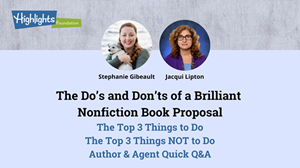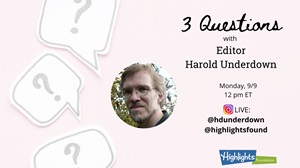Andy Boyles, science editor at Highlights magazine, gave these remarks at our 13th Annual Writers Workshop at Chautauqua, in 1997.
Some thoughts for writers from an editor’s viewpoint:
1. Try to get some insight into what the editors are looking for, what the editors think about their readers. One way to do that is to read a lot of articles. Go to your library and get the magazine you want to write for. Don’t read only the kinds of articles you want to write. Read – or at least scan – the whole publication. You’re doing research about your reader by reading the magazines.
2. Read analytically. As you read, make notes about how the author gathered and used information. How many people do you think the author interviewed? Are there lively anecdotes? Direct quotations? How many? How does the author use these to make the story feel real? What the aspiring writer is looking for is not a formula to write by. Instead, look for red flags. If you write an article that has no anecdotes and no direct quotations and almost every article in the magazine you want to write for has direct quotations and anecdotes, those are red flags. The editors will be looking for something you cannot yet give them.
3. Learn a variety of ways to gather information, such as doing interviews, sniffing out the little-known details, sharpening your own abilities in observation.
4. Narrow your focus. If an editor sees that an author is writing science or nature one week, history the next, and sports the next – the editor gets the impression that the author is almost blindly casting about, hoping to stumble on something that sells. And I think many writers do that, spreading themselves too thin while trying to figure out what kind of writing they want to do.
I personally think it’s better to pick one area, set a goal for yourself — “I’m going to sell one nature article to Highlights” — and then nail it. You can grow in to the other areas later. If you focus on one area, over time you’ll discover that things become easier. If you start to write about dinosaurs and then switch to the Civil war, each time you start at square one. But if you get into either topic and stay with it, then each time you do an article, a lot of your research is already done because you did it for the last article. You’re building up a body of knowledge all your own. Each of your articles thereafter has more depth, more understanding, and more insight. You begin to write less like a novice and more like a professional with a sustained interest in a few areas.






